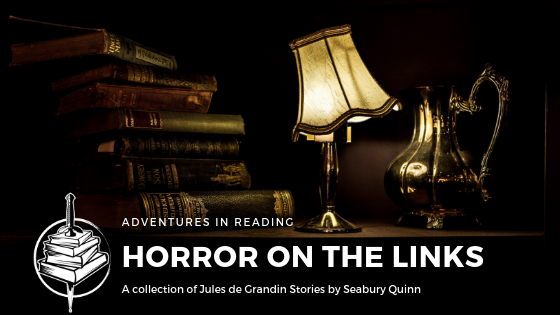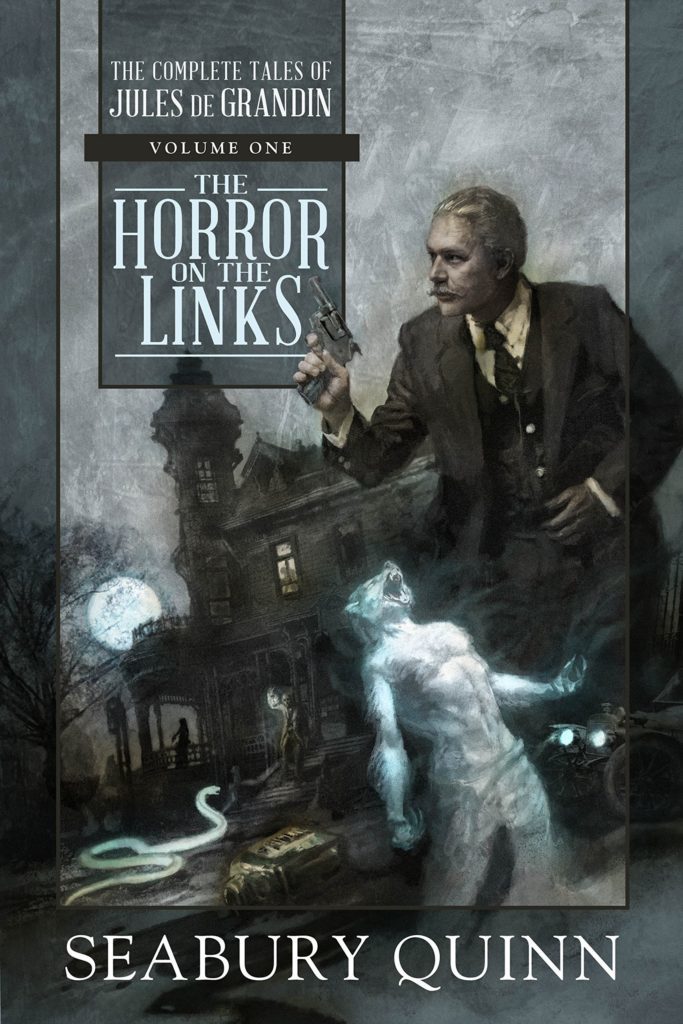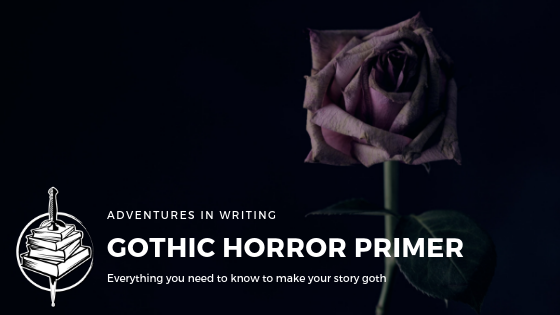
by Matthew Tansek | Feb 4, 2020 | Musings
So I was asked the other day why it is that I read horror fiction. It’s a fair question, and probably one that resonates with a lot of those that don’t find themselves drawn to stories that are quite so dark. It might even sound like an unpleasant experience being drawn into a story where things are going to go from good to horrible. But before I dive into the reasons that I read horror fiction, let me tell you first off that it’s not like I read all kinds of horror fiction. Like most people, there are certain types of stories that I find way more pleasant to read and get my mind firing. I am NOT a big fan of super graphically gory fiction or stories that involve truly awful things like rape or mutilation. If the story could be described as Saw-esque it is not for me. And please don’t think I am criticizing you if that is your thing, to each their own. But for me, the kind of horror that I truly find fun to read are stories that are more conceptually horrible, supernatural, or novel in nature. So this is really just a personal list for me, but I think that it will strike a chord in many of you that like me enjoy this particular flavor of horror.
1 – The Stakes Are Higher
In almost every other form of fiction, you are aware that at the end of the day things are going to work out ok for the protagonist. I mean even if they bite it in the end, things are going to go the right way for the good guys. But ho, not so in horror fiction. The best kind of horror fiction builds up the stakes for the good guys, draws you into the characters and makes you invested in them, and all the while you know that there is no promise that things are going to turn out ok. The difference is like bowling with and without the bumpers in the gutters. The risk is real, the tension that is created is more real, and the edge of your seat experience as things ramp up in the story can be so much more intense because of it.
2 – The Appeal of Regular Joe
Good horror is all about relatability, and that means that the protagonist isn’t going to be someone that is going to be all that different from you or me. Regular people trying their best to cope with horrifying situations and cunning evil entities. Protagonists in horror stories have to rely on the simple strengths of humankind, mental resourcefulness, and the WILL TO SURVIVE!
3 – Genera Spanning
If you are reading a western do you know where it is going to take place? How about if you are reading a fantasy novel? But horror? Yeah, not so much. Horror doesn’t play by those rules, it exists wherever the author wants it to exist; just as likely to be lurking in the basement of an old farmhouse as it is in a dialect space vessel. Fans of horror are rewarded with an incredible variety of characters, settings, and world-shaping machinations. The flavors are so varied that it’s a general that you can really never get bored of (at least I never do).
So there you have it, the top three reasons why I read the kind of horror that I do. But if there are aspects of horror that pulls you toward it that are different than mine, please let me know! Little by little, we are going to chip away at this barrier of entry for this type of story, and yunno I think a whole host of people that would have never tried it out will be pleasantly surprised at how much they enjoy it.

Featured image by Aphiwat chuangchoem

by Matthew Tansek | Sep 17, 2019 | Adventures in Reading
You probably have heard of the movie The Neverending Story, but if you are like me not so much about the book. So in the interests of self-discovery, and for the love of a good book I’ve decided to make something special of my reading of Michael Ende’s Neverending Story. Specifically looking at the symbolism in the book, discussing what resonates with me and what I think makes this piece so powerful.

[T]he story begins with a simple scene of Bastion coming to Coreander’s book store. We learn that Bastion is a picked-on kid, that I picture to be about in middle school age, and that really doesn’t have a whole lot going for him. He doesn’t do well in school, he doesn’t go in for sports, and he feels pretty bad about himself. So as far as the story goes you really couldn’t have asked for a better protagonist if you want the nature of the tale to be about self-discovery.
Coreander’s book store seems like the kind of place that I would really like. Quiet, seemingly off of the beaten path, and full of esoteric materials. Carl Coreander comes off as a gruff, unsympathetic grownup who doesn’t have much of a care for kids, even one so pathetic as Bastion. I did wonder at this point how Carl came into possession of the book, or if its origin is ever explained in the text. It changing hands to Bastion is momentous, but what of Coreander, what did the book represent to him?
The hook, of course, is the acquisition of the Neverending Storybook by Bastion. He is seemingly preternaturally drawn to it, and can’t help himself but steal it once Carl’s back is turned. This being drawn to and stealing of the book feels a bit forced, less guided and more manhandled by the will of the author. But I guess in a book where you have fate playing such a big role, you can get away with a bit of a kick in the pants to get the ball rolling.
The symbolism that really comes through for me in this little preamble is the book itself. Clearly representing the want for escape by our protagonist, and the gateway into the unknown.
Bastion doesn’t know where to go and ends up hidden away in his school’s attic, where he makes himself comfortable and begins reading the story.

by Matthew Tansek | Feb 20, 2019 | Musings
Let me take a moment and put down some of my thoughts about this great little occult detective series.

[ezcol_2third]
[S]ometimes there is just nothing better than indulging your weaker side and diving into a story that you know is just going to be a lowbrow delight. You know you’re not going to come away enlightened or smarter. No wisdom is going to really be imparted to you, just the enjoyment of the experience. As I picked up my Kindle last night I found myself doing just that, seeking out a treasure trove of entertainment simply for entertainment’s sake. So let’s take a look at this little gem, shall we?
If you’re interested in this book here are the notes from the publisher:
Today the names of H. P. Lovecraft, Robert E. Howard, August Derleth, and Clark Ashton Smith, all regular contributors to the pulp magazine Weird Tales during the first half of the twentieth century, are recognizable even to casual readers of the bizarre and fantastic. And yet despite being more popular than them all during the golden era of genre pulp fiction, there is another author whose name and work have fallen into obscurity: Seabury Quinn.
Quinn’s short stories were featured in well more than half of Weird Tales’s original publication run. His most famous character, the supernatural French detective Dr. Jules de Grandin, investigated cases involving monsters, devil worshippers, serial killers, and spirits from beyond the grave, often set in the small town of Harrisonville, New Jersey. In de Grandin there are familiar shades of both Arthur Conan Doyle’s Sherlock Holmes and Agatha Christie’s Hercule Poirot, and alongside his assistant, Dr. Samuel Trowbridge, de Grandin’s knack for solving mysteries—and his outbursts of peculiar French-isms (grand Dieu!)—captivated readers for nearly three decades.
Collected for the first time in trade editions, The Complete Tales of Jules de Grandin, edited by George Vanderburgh, presents all ninety-three published works featuring the supernatural detective. Presented in chronological order over five volumes, this is the definitive collection of an iconic pulp hero.
The first volume, The Horror on the Links, includes all of the Jules de Grandin stories from “The Horror on the Links” (1925) to “The Chapel of Mystic Horror” (1928), as well as an introduction by George Vanderburgh and Robert Weinberg.
[/ezcol_2third] [ezcol_1third_end]

[/ezcol_1third_end]

[ezcol_1third]
Collection:
The Horror On the Links
[/ezcol_1third] [ezcol_1third]
Story Title:
The Curse of Everard Maundy
[/ezcol_1third] [ezcol_1third_end]
Author:
Seabury Quinn
[/ezcol_1third_end]

Story Hook
Trowbridge and de Grandin notice that there seems to be a preponderance of suicides in Harrisonville. de Grandin, itching to sink his teeth into a new investigation starts looking into the deaths to see if there is a connection between those dead.
Interesting Elements
This story is one that has a lot more twists and turns than the usual de Grandin romp, and perhaps that is why I like it so much. The investigation into the suicides leads our heroes to a suspicious preacher, who then turns out to just be another victim in his own way. Trowbridge nearly succumbs to his own dark thoughts, empowered by an unknown evil. A beautiful ghost transforms into a malevolent hag, and we even get to see de Grandin go toe to toe with the walking dead! It definitely felt like Quinn put some more effort into making this one more action-packed, ratcheting up the tension with the ever-present and indefensible threat of suicide.
Reflection
I’m not going to say that this (or any of the other de Grandin stories) is a great work of literature. But what I will eagerly say is that this story was a lot of fun to read and I think really showcases the characters in a great way. We get to see what Trowbridge brings to the table by way of his medical know-how and local geographical knowledge. We get to see the seemingly limitless ego of de Grandin and his compulsion to wage a crusade against supernatural evils. You know, often times this is not the case which helped to make the tale feel more rounded. Additionally, we seem to have departed from Quinn’s formulaic output and veered off into a write-by-the-seat-of-your-pants type of story which I think made it more fast-paced and unpredictable. The hook felt fresh and unforced, and the investigation as a whole felt more or less organic, despite de Grandin’s habit of keeping the facts to himself until the big reveal at the end of the story.
Looking back now that I have read quite a few of these little stories I have to say that this one stands out. The supernatural entity is just foreign enough, and the solution to the problem is less of a write off than in other tales. I think that Quinn’s background working in funeral homes and around death may have inspired and informed aspects of this story. de Grandin is a Mary Sue to be sure, but once you can get behind him it’s a delight to see him cut his way through the plot. If I were to recommend a Jules de Grandin story to someone, I would say to start with this one.


by Matthew Tansek | Jul 19, 2018 | Primer
I was asked the other day by a friend what my reading recommendations would be for someone looking to create a tabletop game in a Gothic horror setting. I put together the following, and thought that it might be useful for others out there so I’m going to re-post it here. It’s by no means a definitive list, but it will more than get you in the right headspace to ensure you hit all the right notes. Enjoy!

[S]o rather than give you some lengthy novels to read, I’m going to focus on my favorite short stories done in the classic Victorian Gothic style, from the period. And fortunately for you they are all going to be in the public domain, so I’ll dig up some links for them 🙂
If it’s helpful, here is what I would keep in mind building a Gothic tabletop game:
The Byronic Hero:
“a man proud, moody, cynical, with defiance on his brow, and misery in his heart, a scorner of his kind, implacable in revenge, yet capable of deep and strong affection.” – Byron
Gothic tropes:
- Gloomy villain
- foreboding locations
- Persecuted heroines
- Juxtaposition of wealth and order next to barbarism and poverty
- Obsession with mourning rituals, mementos, and the degradation of morality
- Extreme curiosity of what lies beyond the veil. Often roped together with the growing spiritualist movement at the time.
Recommendations:
- Strange Case of Dr Jekyll and Mr Hyde – The lengthiest one on the list, but one of the best. It hits all of the hallmarks of the genera and is an absolute classic. You may have already read this one so I’ll not carry on about how great it is. Stevenson does not use purple prose, so this shit moves fast.
- Dracula’s Guest – For those of you who don’t have time for Dracula (which is an awesome read and probably the first thing everyone thinks of when they think about Gothic fiction) we have this little short story. First written as part of Dracula, then cast off as its own short story, its a lot of fun and uses great language the way only Stoker can.
- Casting the Runes – MR James is the father of the modern ghost story. He has some great work in the realm of weird fiction, but if your looking for a more Gothic piece I remember really liking this one.
- Facts in the Case of M. Valdemar – Perhaps one of Poe’s most gory pieces (I think he must have written it with an anatomy book open next to him). An easier Poe work to get through (sometimes his language can be a bit thick) that like many of his shorts is benefited from the author’s obsession with death.
- The Striding Place – Gertrude Atherton (a female writer in a time dominated by men) I think captured the Gothic contemplation of the spirit/soul and the morbid thoughts of it lingering on after death. If you are looking to build a tabletop game around the ideas of death and the soul (classic tropes of the genera) then I think this would give you a good primer for what the zeitgeist was at the time.
- The Phantom ‘Rickshaw – A straightforward little tale about a man being driven mad by a ghost. I liked the language used by the narrator to reveal the increasing madness and desperation.
Steer clear of:
- The Mummy’s Foot – Ugh, just terrible. You’d think it would be cool with a mummy and all, but alas it really lets you down. I want to be enchanted by an Egyptian Princess as much as the next guy but sheesh.
- The Vampyre – It might be sacrilege for me to say so, but I think that the Vampyre by Paolidori is really only interesting if you are want to read it for historical reasons. Or if you really want to see a Vampire Lord be a total dick. Not worth the time it would take you to get through.
- The Mystery of Edwin Drood – Dicken’s does not deliver. There is a bit of hype around this one since he died before it could be completed. Read only if you are interested in the author IMO.
If you’ve got any additions or subtractions to this list, by all means feel free to comment below 🙂

[ezcol_1half]
If you want to support this kind of content:
[/ezcol_1half] [ezcol_1half_end]
Credits:
Photo by Sharon McCutcheon on Unsplash
[/ezcol_1half_end]

by Matthew Tansek | May 30, 2018 | Musings
Like many people I’ve got a deep fascination with the pulp stories of yesteryear, and up until this point I had thought I had read all of the occult detective stories that were out there that had been written in that time period. I marveled at the electric pentacle of Thomas Carnacki, and the Ghost Busters-esque hauntings that he set out to solve. I mulled over the philosophical implications of the paranormal with John Silence, or Flaxman Low.
And then like a gift, a new occult detective stepped from the shadows; Seabury Quinn’s character, Jules De Grandin.
I discovered the fussy paranormal version of Agatha Christie’s Perot while reading Conan’s World and Robert E Howard by Darrell Schweitzer. Which sent me on a prolonged scrounge though my personal library to see if I already owned any of the stories in question. Often it is the case that I will acquire compendiums and collections for one or two particular works, and not ever get around to reading the thing cover to cover. Lo ad behold, I came up with three De Grandin stories that had up until that point slipped quietly by me, nestled in Wildside press’s 25 Occult Detective Stories Megapack.
Needless to say I plowed through them with great fervor. Here are my quick thoughts about each, there will not be spoilers.
The Jest of Warburg Tantavul
A solid introduction to the character of Jules De Grandin and his stalwart comrad Dr. Trowbridge (who at this point in time to me seems very much cut fro the same cloth as Doyle’s Dr. John Watson). It’s a story that both depicts the rigid religious mindset of people at the time, with innovative ideas on how to deal with the supernatural. De Grandin’s French idioms are on full display, as well as his straightforward approach to things seemingly out of the realm of possibility. The story left me with questions about the nature of the supernatural elements, and the motivations of Warburg Tantavul, but resolved enough to feel satisfying by the end of it. Definitely my favorite of the three that I read.
Pledged to the Dead
Certainly an interesting read, and a concept that I didn’t see coming at the outset. Would I have liked to see more of the steamy streets of 1920’s New Orleans? Yes. Was it necessary for the story? I guess not. The supernatural element was inventive, and you get to experience a story that comes right up to being risque (or at least risque for the times). Like the story before it you get to see a bit of how progressive Seabury Quinn was, presenting the reader with real world problems (albeit not real world causes) and a level headed set of characters responding accordingly.
The backstory as to why the supernatural shenanigans took place seemed weak, and were not satisfactorily reasoned or solved in my opinion. It also left me
Incense f Abomination
Definitely a story that showcases the pulp magazine’s desire to have racy vulnerable women on it’s cover. This story was fun to read for a number of reasons. Firstly it has a bit more of a detective element at the outset, with De Grandin taking action on the streets of Harrisonville New Jersey. It has a great set of exchanges between the character relating the story and De Grandin which shows the snappy wit of Seabury Quinn and the guile of his detective character.
What this story fails on for me is the murky rationale of the apparition that plays prominently at the end of the story, and the eventual proposed and enacted solution to the problem. Degrandin in the first two stories showed almost a scientific mindset, or at least provided a clear explanation of the world’s internal logic. But in this one it felt like things were rushed and not particularly well reasoned.

If you’ve read any of Seabury Quinn’s Jules De Grandin stories and have an opinion feel free to leave a comment below. I’m sure I will be delving into more of these stories in the future, and will let you know as I go along. They are fun, easy reads that hit the right chords of action and memorable characters. Would definitely recommend.







